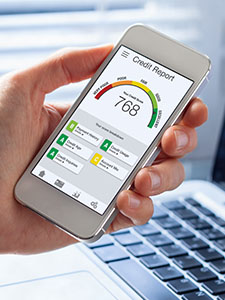POST TAGS
CreditBlog posted On July 07, 2021

If you have a less than perfect credit score, applying for a mortgage or other type of loan might feel impossible. Fortunately, there are several mortgage programs that have lenient credit requirements plus many ways you can boost your score on your own before you apply for a mortgage.
The most influential factor for both your FICO® credit score and VantageScore is your credit history. If you have a good history of paying your monthly debts on time, this is a good indicator that you will be able to handle your future debts responsibly as well. “You want to avoid things like late payments, defaults, repossessions, foreclosures, and third-party collections,” says John Ulzheimer, credit expert, formerly of FICO® and Equifax. “And filing bankruptcy is a horrible idea. Anything that would indicate non-performance of a liability is going to harm your credit score.”
Your credit utilization rate shows how much of your available credit you actually use. The lower your credit utilization, the better. “The higher that ratio, the fewer points you’re going to earn in that category and your scores are absolutely going to suffer,” Ulzheimer says. “In fact, people who have the highest average FICO® scores have a utilization of 7%.”
You might feel like wiping the slate clean and starting over will help boost your score. However, it’s quite the opposite. Leaving debts on your report shows lenders and scoring companies that you can handle and completely pay off large debts. “An account that’s paid in full is a good thing; however, closing an account isn’t something that consumers should automatically do in the hopes that it will positively impact their credit score,” says Nancy Bistritz-Balkan, vice president of communications and consumer education at Equifax. “Having an account with a long history and solid track record of paying bills on time, every time, are the types of responsible habits, lenders and creditors look for.”
Closing your credit card accounts can actually lower your credit score. When you close an account, you will have a lower maximum credit limit. But you also don’t want to keep an account open with a carried balance. So, it’s best to keep your credit card with a balance of $0 open, even if you aren’t using it.
Every time you apply for a new line of credit, your credit card company will pull a hard inquiry on your report – which will lower your credit score temporarily. However, the effects of a hard credit pull could last up to 12 months. If it’s a single hard credit pull, then it will likely be a smaller drop on your credit score. A string of hard inquiries could show lenders that you are taking on too much debt and could result in a larger drop. One way to avoid hard credit pulls is by applying for prequalification or preapproval – these generally result in a soft credit pull instead. Soft pulls don’t affect your credit score.
Viewing your own credit results in a soft inquiry – it doesn’t hurt your score. You should strive to check in on your score every few months to make sure that it is heading in the right direction. If it’s not, you may need to make some changes.
Your credit score affects a lot of other financial prospects. In almost every application where you will be taking on future debt, people will likely review your score. In the mortgage world, if you have a higher credit score, you will likely qualify for a lower mortgage rate. To check your credit score, you can use any of the three credit bureaus – TransUnion, Experian, or Equifax. To get started on your prequalification, click the “Get Started” button above.
Sources: Money.com